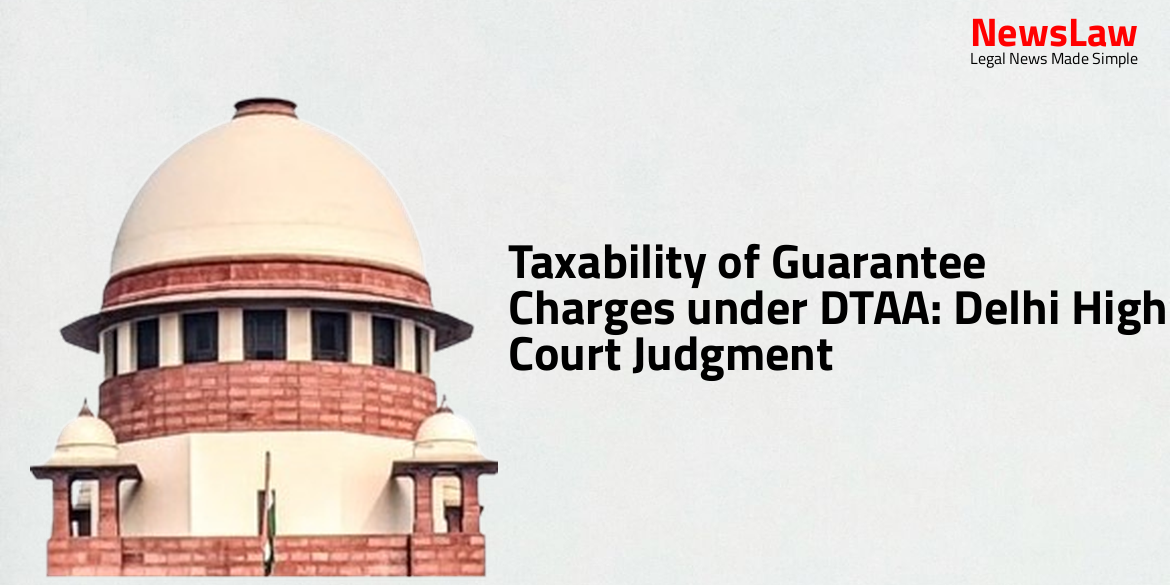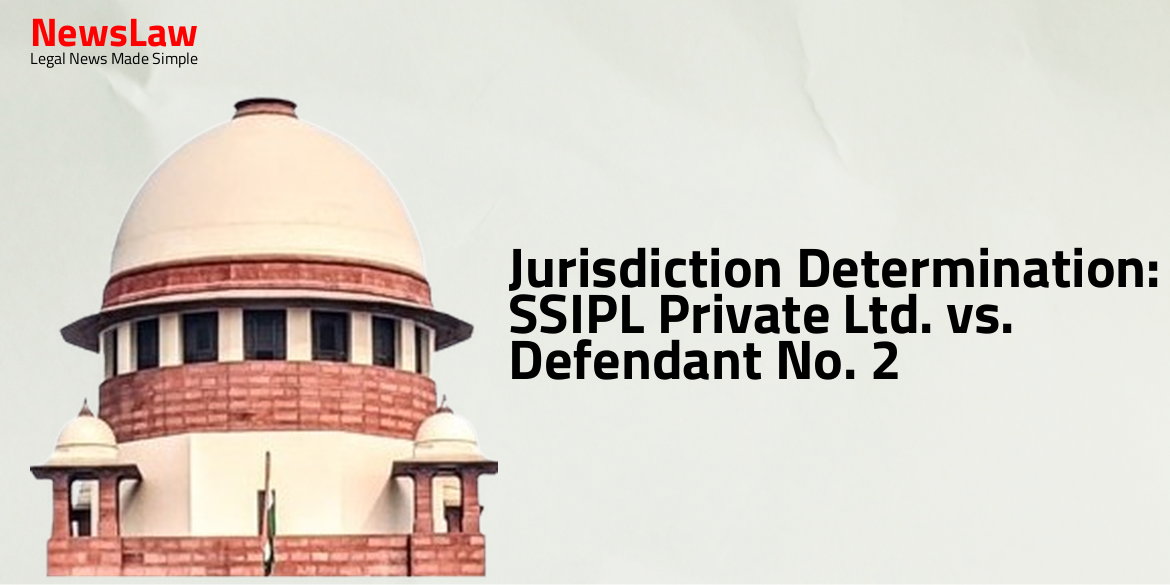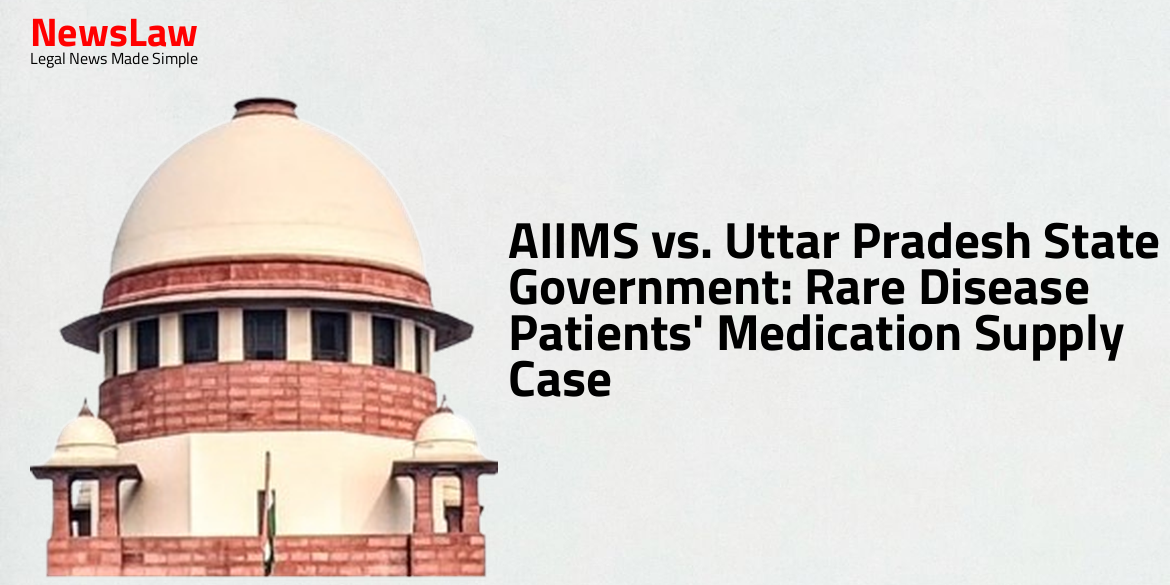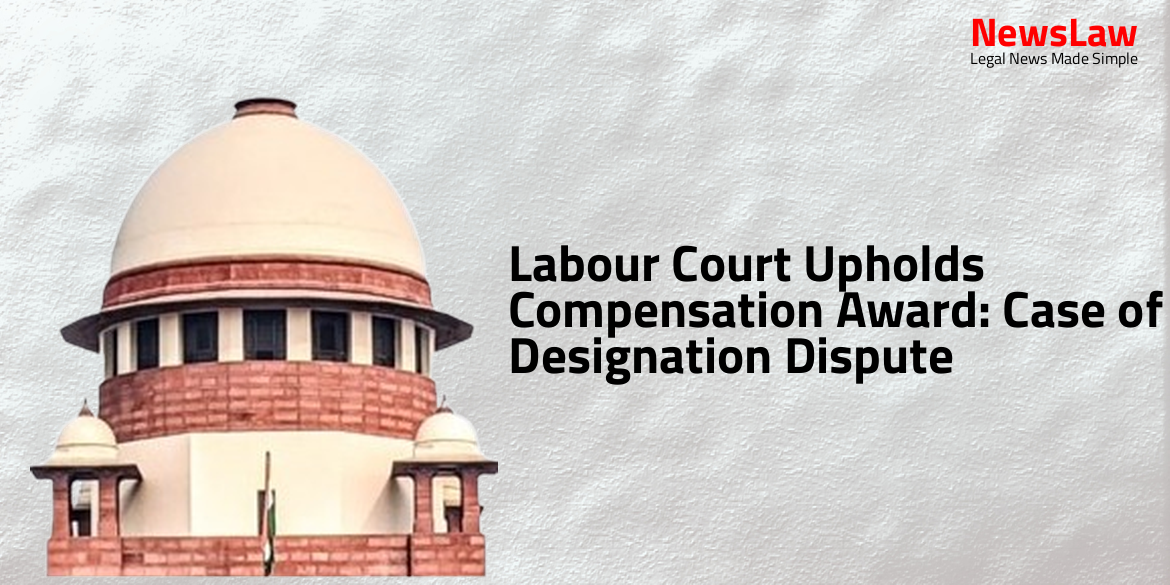In a significant ruling by the Delhi High Court, the taxability of guarantee charges under the DTAA is examined. The case sheds light on the intricate taxation implications of guarantee charges accrued by the appellant in India. Follow the detailed analysis of the judgment to understand the impact on income tax regulations. Stay updated on the latest legal interpretations in tax matters.
Issue
- The issue in question pertains to the taxability of guarantee commission received by the appellant from its Indian subsidiaries.
- The appellant raised a contention that since the source of the guarantee for Associated Enterprises to foreign banks is outside India, the guarantee charges cannot be held taxable in India.
- The specific focus of the issue is on whether the guarantee commission falls within the ambit of ‘interest’ as specified in the Indo-UK DTAA.
- The dispute arises from the interpretation of the Intra Group Parental Guarantee and Counter Indemnity Services Agreement dated 29 March 2010.
- The Income Tax Appellate Tribunal, DRP, and AO have all played a role in the decision-making process related to this issue.
- The crux of the matter revolves around the characterization of the guarantee charges and their tax implications under the relevant tax laws and international agreements.
Arguments
- The appellant challenged the view of the AO and DRP regarding the taxability of interest income under Article 12 of the DTAA.
- The appellant argued that guarantee charges could potentially be considered as business income governed by Article 7 of the DTAA.
- The Tribunal referred to the legal fiction in the Income Tax Act regarding income accrual in India, stating that guarantee charges accrued to the assessee in India and were therefore taxable.
- It was noted that the appellant did not engage in providing corporate or bank guarantees as a regular business activity, hence guarantee charges could not be classified as business income under Article 7 of the DTAA.
- The appellant’s alternative argument regarding the nature of guarantee charges as interest or business income was considered, with emphasis on the source of income and the services provided.
- Citing relevant interpretations of the terms ‘accrue’ and ‘arise’ in tax laws, the Tribunal analyzed the nature of the guarantee charges and their taxation implications.
- The appellant’s plea that the guarantee charges did not have a taxable presence in India under Section 5(2) and Explanation 1(a) of Section 9(1)(i) of the Act was discussed.
- Reference was made to the global corporate guarantee arrangement entered into by the appellant and its subsidiaries, highlighting the incidental nature of the guarantee charges.
- Arguments regarding the absence of Permanent Establishment and the applicability of DTAA provisions in taxing business income were presented.
- A comparison with a relevant US Court of Appeals decision on guarantee charges was made to explain the source and nature of income in the present case.
- Mr. Maratha, representing the respondent, argued that income accrued in India due to loans availed by Indian subsidiaries as per Section 5(2) of the Act.
- The respondent contended that since the loan transaction occurred in India, it cannot be denied that income accrued there.
- Providing corporate guarantees was deemed by the respondent as not falling under the business activity of the appellant and hence not considered as business profit under Article 7 of the DTAA.
- Mr. Maratha referred to the landmark judgment in E.D. Sassoon & Company Ltd. vs The Commissioner of Income-Tax to explain the meaning of ‘arise’ and ‘accrue’ in Section 5 of the Act.
- The respondent emphasized that income accrual does not require actual receipt, opposing the appellant’s claim that income did not arise in India.
- The issue of the existence of a Permanent Establishment of the appellant was brought up by the respondent, noting that it was not decided.
Analysis
- The Tax Court’s factual findings are not clearly erroneous regarding the characterization of guarantee charges under Article 12 of the DTAA.
- The appellant provided guarantees to overseas branches of foreign banks for credit facilities to Indian subsidiaries, earning guarantee charges.
- The term ‘interest’ is defined in the context of the payer, accrual, and income source.
- The appellant accrued guarantee charges through an agreement with its Indian subsidiaries, not based on contracts with foreign banks.
- The guarantee charges were for providing parent company guarantees and counter-indemnification to Indian subsidiaries, not debts.
- Income accrual is essential for taxation, regardless of utilization or ultimate destination of the income.
- Accrual and arising of income must be linked to debt claims or debt-related services to be classified as ‘interest’.
- The Tribunal correctly determined that the guarantee charges did not fall under Article 12 of the DTAA.
- The income source and privity of contract are crucial for categorizing payments like guarantee charges as ‘interest’.
- The privity of loan contract and the existence of a debtor-creditor relationship are necessary for income to qualify as ‘interest’.
- Tax Court’s correct view that secondary obligation performed outside the United States was valid.
- Income in form of guarantee charges accrued and arisen in India.
- Guaranty fees considered analogous to payments for services.
- Principles of ‘accrue’ and ‘arise’ interpreted as a periodical monetary return received with regularity.
- Income accruing not dependent on actual receipt but on the right to receive.
- Guaranty fees founded mainly on the Intra Group Agreement.
- No income tax liability on accrued but not received profits.
- Income deemed to arise or accrue upon right to receive.
- Definition of ‘income’ in Indian Income Tax Act discussed.
- Words ‘arising or accruing’ indicative of a right to receive profits.
- Series of judgments discussing income accruing or not accruing.
- Observations on ‘accrue’ and ‘arise’ in the context of income taxation.
- Interpretation of ‘income’ in Indian Income Tax Act by Privy Council.
- Discussion on ‘accrue’ in various rulings and definitions.
- Income accrued if surrendered or relinquished after accrual.
- Tax liability on all income that accrues regardless of its usage or disposal.
- Guaranty fees seen as more like payments for services rather than loans.
- Judicial interpretations on right to receive income and its accrual.
- Income may accrue without actual receipt.
- The Act consciously avoids the word ‘received’.
- Principles regarding determination of income accruing or arising.
- Income accrual not contingent on actual receipt.
- Critical assessment of words ‘arise’ or ‘accrue’ in relation to income.
- Rulings on income from various sources and their accrual status.
- Words ‘arising or accruing’ not to be read as ‘received’.
- Judicial observations on ‘accrue’ and ‘arise’ as a right to receive income.
- Difference between ‘accrue’ and ‘arise’ and their significance for income taxation.
- The Agreement shall continue until there are no longer any outstanding parent company guarantees and counter-indemnified obligations between the Provider and the Recipient.
- The Agreement may be terminated by the Provider if the Recipient passes a resolution for winding up, makes a voluntary arrangement with creditors, has a receiver appointed, or if any equivalent event occurs in the jurisdiction of either party.
- Interest arising in India paid to a UK resident is tax-exempt if related to a loan guaranteed by the UK Export Credits Guarantee Department. Similarly, interest arising in the UK paid to an Indian resident is tax-exempt if related to a loan guaranteed by Indian export credit entities.
- Notices under this Agreement must be in writing and sent to the specified addresses of the Provider and Recipient.
- Parties are not liable for delays in performance due to circumstances beyond their control.
- The Recipient cannot assign the Agreement to a third party without the Provider’s written consent, except in specific circumstances.
- Tax relief on interest payments does not apply if the recipient is exempt from tax on such income in their resident country and sells the holding within three months of acquisition.
- The Article on Other Income states that income owned by a resident of a Contracting State is taxable only in that State.
- Upon termination, the Provider must invoice the Recipient for all unpaid services plus VAT, and the Recipient must pay accordingly.
- Failure to pay by the due date allows the Provider to suspend services until payment is made.
- All amounts payable are exclusive of certain taxes, with WHT applicable. Recipient must provide evidence of WHT deduction upon request.
- The Agreement may be executed in multiple counterparts, all of which together constitute one instrument.
- The Agreement is governed by the laws of England and Wales, with jurisdiction in the courts of England and Wales.
- Specific provisions regarding tax rates on interest payments to banks, governments, or certain entities are outlined.
- The Article on Other Income exemptions apply differently based on the residency and business activities of the interest recipient.
Decision
- The Agreement can be terminated by either party with one month’s notice in writing for new instances of the provision of services.
- Payment to the Provider must be made according to the instructions on the invoice.
- The Provider agrees to provide facilities for company guarantees and counter-indemnification as required by the Recipient.
- Any amendment to the scope of services requires written agreement from both parties.
- Services will be charged on a quarterly basis on specific dates.
- The Annual Rate of 1.125% will be applied to the Recipient’s outstanding balance of guarantees and obligations.
- The Annual Rate is expected to meet the arm’s-length standard.
Case Title: JOHNSON MATTHEY PUBLIC LIMITED COMPANY Vs. COMMISSIONER OF INCOME TAX, INTERNATIONAL TAXATION -2, NEW DELHI (2024:DHC:4330-DB)
Case Number: ITA-727/2018



